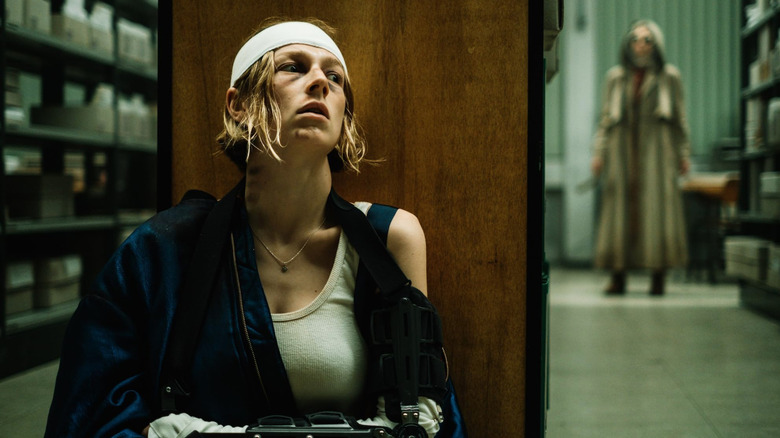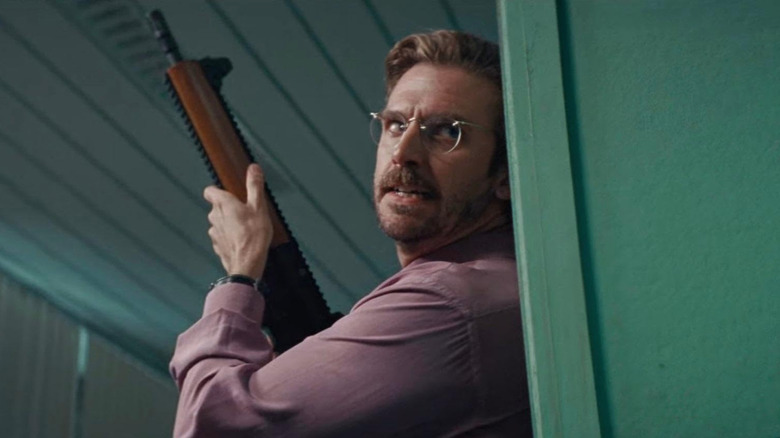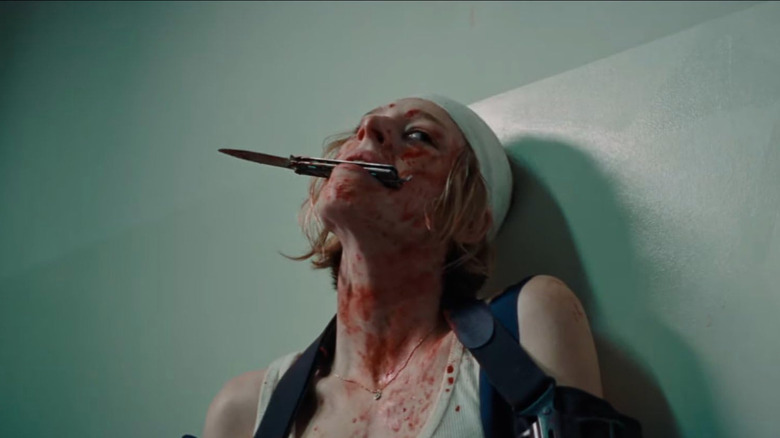Cuckoo Review: Hunter Schafer's Horror Movie Will Leave You Baffled
- Hunter Schafer and Dan Stevens give great performances
- Impressive cinematography
- The plot makes little to no sense
- Doesn't offer much emotional connection
"Cuckoo," written and directed by German filmmaker Tilman Singer, arrives in theaters in the wake of its distributor, Neon, breaking box office records with two of the best horror movies of the year: "Immaculate" and "Longlegs." "Immaculate" succeeded largely on the excitement of Sydney Sweeney taking on a meaty "final girl" role, and "Cuckoo" offers Sweeney's "Euphoria" co-star Hunter Schafer the same opportunity. The similarities between "Cuckoo" and "Longlegs," meanwhile, have less to do with the content of the films themselves than with Neon's intriguingly cryptic marketing campaigns, with trailers promising big scares while telling viewers as little as possible about the films' actual plots.
The big difference that's sure to hold "Cuckoo" back from "Longlegs"-level success is that this time, keeping the whole plot in the dark isn't just a marketing strategy but a filmmaking one. In the film's press notes, Singer describes his process as trying to "find two secrets," and deciphering those secrets would take work. This supremely strange horror film takes an hour to reveal the "first secret" of its premise, and rather than clicking all the mysteries into place to clarify the "second secret," its big reveals just raise more questions. I'm glad I'm not writing an "Ending Explained" feature about this movie because I wouldn't know where to begin, both in terms of what (if anything) actually happens and what (if anything) it actually means.
Is it fun despite this confusion? At times. Dan Stevens is having the most fun as the over-the-top creepy German motel owner Herr König, and Schafer brings a charismatic and sympathetic presence in spite of the many unlikable traits of her above-it-all protagonist, Gretchen. The cinematography is gorgeous, and the audacity of the twists can be darkly funny. But thinking about "Cuckoo" afterwards, I feel like I'm missing the key to making sense of and really connecting with it.
Big trouble in rural Germany
How much can be said to summarize "Cuckoo" without getting into spoilers? It follows a family living and working at a motel in the German Alps. Seventeen-year-old Gretchen misses her mother and her home back in the United States and has little patience for her father, Luis (Márton Csókás), stepmother Beth (an extremely underutilized Jessica Henwick), and 7-year-old stepsister Alma (Mila Lieu). Hired by Herr König as a receptionist, Gretchen notices a lot of strange things at this motel. Various women keep vomiting. Time seems to repeat itself. Did I mention the scary hooded woman with glowing red eyes (Kalin Morrow)?
Gradually discovering the weird horrors offers some entertainment at first. The sound design allows for a few effective jump scares. Paul Faltz's 35mm cinematography looks great, with a vibrant palette of greens and oranges, and crafts some choice images for building suspense (the most memorable, perhaps, in the gradual reveal of the hooded woman's shadow behind the shadow of Gretchen's bicycle). Hunter Schafer and Dan Stevens are acting in completely different registers, but her believable cynicism and his cartoon villainy play off each other effectively — performance-wise, the clash of divergent tones works.
Once it's time to reveal König's dark secrets, however, one might wonder if it would have helped for Tilman Singer to pick a lane. Is the semi-secret actual premise of the film — which you might be able to take a wild guess at based on the title — supposed to be treated as a serious metaphor or as pure schlock? The best horror movies can work on both levels, but "Cuckoo" doesn't go far enough in either direction, becoming stuck in an oddly uninvolving middle space. Both the meaningful and the ridiculous need some sort of clarity — even if a story is confusing or abstract by design, the clarity of symbols and emotions still matters. And that's where "Cuckoo" appears lacking, at least on first viewing.
What does it mean?
I gather "Cuckoo" is making some attempt at telling a feminist story. Nobody listens to Gretchen's warnings because society doesn't take teenage girls seriously. König's motives are ... underexplained, but it did stick out to me how he talks about "reproduction," seeming to treat that as the main value he places upon women. As a lesbian, Gretchen challenges this restrictive vision of womanhood, and while it's never said whether Gretchen is cis or trans — Hunter Schafer is tired of playing "trans" roles — a trans reading of the character offers yet another such challenge to König's patriarchal thinking. I'm interested to read more feminist analysis on the film, ideally by writers who managed to understand enough of the plot to have more actual analysis.
Alma is nonverbal, communicating with a mix of typed speech and sign language, and experiences seizures. It's hard for me to say whether her eventual connection to the thing that's happening is playing into the history of ableism within the horror genre or subverting it. The ending leads me to believe the latter is the intention, but how it comes across amidst such vague storytelling, I'm not sure. There's a parallel conversation to be had about just how often these silent characters in movies happen to be Asian, and the questionable stereotypes there.
My overall mixed and neutral impressions of "Cuckoo" come down to a mix of bafflement and distance. I enjoy weird movies, and I don't need every single detail to be explained, but in this case, my lack of understanding led to a lack of emotional attachment. Perhaps it might suddenly click if I give it another chance, but I'm less than certain if I'll have the motivation to give it that chance.
"Cuckoo" opens in theaters on August 9.


